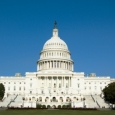Food, Drug, and Cosmetic Act of 1938
The Federal Food, Drug, and Cosmetic Act of 1938 greatly increased both the FDA’s regulatory power and the scope of its attentions. The law expanded the agency’s focus beyond fraud to encompass safety as well. Most importantly, the 1938 act was the first law to require the testing of drugs before they were sent to market. It also banned drugs that didn’t list all their active ingredients. The Food, Drug and Cosmetic Act expanded the FDA’s authority to cover all medical devices and all cosmetics (with the exception of soap), and provided stronger regulation over deceptive packaging for food containers.
Commentary
Cry Wolf Quotes
No manufacturer can possibly continue in business except by the grace of the officials in Washington.
[The bill] will seriously affect employment and morale in the industries indicated. It will put thousands of men and women out of work. It will close dozens of manufacturing plants and hundreds of stores...It will hurt thousands...It will help none...When the ‘Tugwell’ Bill is introduced in Congress, it must be defeated.
Unlimited power entrusted to bureaucrats warps their judgment on the opinions they might have as normal citizens.
If this bill should become law, we will be forced to cancel immediately every line of advertising.


